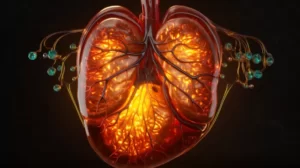Thyroid conditions like hypothyroidism and hyperthyroidism are becoming increasingly prevalent, particularly among women. In fact, one in eight women will develop a thyroid-related issue at some point in their lifetime, and women are five to eight times more likely to have a thyroid condition than men. While an unhealthy diet, physical inactivity, and tobacco use are known to be risk factors for the development of thyroid diseases, researchers have recently connected thyroid disease to chemicals commonly found in your living area.
The Hidden Chemicals in Your Home
Researchers from the Harvard T.H. Chan School of Public Health identified a link between thyroid disease and polybrominated diphenyl ethers (PBDEs), which are flame retardants and known endocrine-disruptors found in furniture, electronics, cars, plastics, and building materials. These chemicals have begun to seep into all areas, showing up in the blood samples of polar bears, eagles, and humans on every continent.
By studying the blood samples of women who participated in the National Health and Nutrition Examination Survey (NHANES), the researchers discovered that those with higher concentrations of PBDEs in their blood were at a greater risk of developing thyroid disease, with post-menopausal women being especially susceptible.
Reducing Your Exposure to PBDEs
While PBDEs are pervasive and you may feel helpless to combat their presence in your life, there are ways to reduce your exposure and protect your health. Among them are the following:
- Check your furniture: PBDEs are commonly found in foam products made before 2005, so if you own an older couch, it may be time for a replacement. If any of the foam in your car or your furniture is damaged, it should be replaced, as PBDEs escape more easily in these circumstances. Additionally, when shopping for new products, seek those that are flame-retardant-free.
- Clean your home thoroughly: PBDEs can spread from their sources and collect as dust, so using a vacuum cleaner with a HEPA filter that removes contaminants is crucial.
- Reduce your overall toxin intake: Since PBDEs are difficult to avoid, combating their effects through your diet is vital. Eating as much organic food as possible, including cruciferous vegetables that help your body detoxify, will help offset the harm caused by these toxins.
- Incorporate mushrooms into your meals: According to Dr. Isaac Eliaz, mushrooms can be beneficial because they help your body absorb various toxins.
- Try a cleansing regime periodically: Undergoing a whole-body detoxification regimen from time to time may be helpful. Be sure to eat nutritiously and pursue a healthy lifestyle during this time.
- Take a daily probiotic: Probiotics, in addition to having numerous health benefits, have been shown to help cleanse toxins from your body.
- Exercise regularly: As toxins are released through sweat, make sure to exercise consistently.
By being aware of PBDEs and the risks they pose, you can now take the necessary steps to reduce your toxic exposure and help protect your overall health, specifically the health of your thyroid.



![8 Simple Rules to Refresh Your Body with a Healthy Cleanse [See Pictures]](https://naturalhealthreserve.com/wp-content/uploads/2024/01/8-rules-healthy-cleanse-slideshow-300x168.webp)